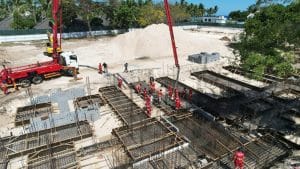Share this article
Be the first to know about our new projects.
2Futures has many new luxury projects in the pipeline. Get notified before the public when there’s a new launch. Benefit from early bird specials.
The Mauritius National Budget for 2024/2025 unveils a host of positive developments aimed at fostering investment and luring foreign talent. Dr. the Hon Renganaden Padayachy, the Minister of Finance, Economic Planning and Development, unveiled the Mauritius National Budget 2024/2025 on 7 June 2024 – the final one under the current government.
Here’s a detailed breakdown of the key highlights for the real estate sector:
“The Mauritius economy is performing well and is forecast to grow at 7%, with a budget deficit and a public debt on a downward trend at 3.4% and 71.1%, respectively, in 2024/25. The different sectors of the economy have shown good momentum, and there is a high degree of optimism, as confirmed by our recent PwC CEO survey, where 83% of local CEOs expressed confidence in the country’s economic prospects,” writes Anthony Leung Shing EMA Deputy Regional Senior Partner, Country Senior Partner, PwC Mauritius, in the company’s Budget report.
“The Budget theme, ‘Tomorrow is Ours’, underscores a philosophy fostering resilience, inclusive growth, and sustainable development. Whilst the economic conditions remain challenging due to factors such as inflation and global slowdown, these are primarily cyclical shocks, and the country seems to be coping with them in the short term.”

Economic growth: The Mauritian economy is forecasted to grow by 7% in 2024/2025, with budget deficits and public debt downward at 3.4% and 71.1%, respectively.
Private sector investments: Private sector investments have reached MUR 131 billion, surpassing public sector investments of MUR 46 billion.
Construction sector: Construction remains a key growth driver, contributing significantly to the Gross Fixed Capital Formation (GFCF), which recorded MUR 177 billion.
Real Estate and Property Development
In 2023, the real estate sector contributed 5% to the GDP and attracted MUR21.1 billion in foreign direct investment.
Green property developments: At least 4% of land for morcellement, Property Development Schemes (PDS), or Smart City projects must be allocated to green forests, predominantly featuring endemic trees, and provide a garden setting and landscape to complement the development and provide usable green space. No morcellement permit will be issued where there are two contiguous residential plots of land unless there is a minimum setback of 30 metres from the new or existing settlements. This ruling will ensure privacy and tranquillity. The upkeep and maintenance of the green forest will be the responsibility of the Association Foncière or the Conservator of Forests. These green spaces will promote responsible land development practices, preserving natural ecosystems and increasing residents’ and visitors’ quality of life.
Environmental assessments: Strategic Environmental Assessments are now required for large-scale projects (morcellements or PDS projects above 10 arpents and any smart city) to ensure sustainable development. An arpent is roughly one acre.
Until June 2025, individuals can benefit from a 5% refund on secured housing loans, capped at MUR 500,000.
A property investor with a secured housing loan to build his home under the home loan payment scheme will continue to benefit from a 5% refund of the loan amount. This arrangement has been extended for loans contracted after 30 June 2024 and for amounts disbursed up to 30 June 2025.
Property investors for permanent residence can receive a 5% refund on the property value, with various conditions applied to different types of property acquisitions, up to MUR500,000.
A property purchased under a vente à terme will qualify for a refund if the buyer pays the purchase price by 30 June 2025. Likewise, a property investor who purchases under vente en l’état futur d’achèvement (VEFA) will be eligible for the 5% refund until 30 June 2025.
A property under reservation will qualify for this scheme if the transfer deed is registered by 30 June 2025.
Reduced thresholds for occupation permits: The threshold for occupation permits for professionals has been reduced from MUR30,000 to MUR22,500, making it easier for foreign talent to work in Mauritius.
Temporary and expert permits: There is now a temporary occupation permit for professionals with a minimum of 10 years of experience and a 10-year expert occupation permit for talent in wealth management, family offices, virtual assets, and virtual tokens. This links to the vision of entrenching Mauritius as an international financial centre by attracting sophisticated and skilled talents. Mauritius aims to position itself as a MUR 1 trillion economy by 2030.
Retirement permit flexibility: Holders of residence permits as retired noncitizens can now work without needing additional work or occupation permits.
Streamlined permit processes: Measures to streamline the regulatory environment include reducing thresholds for occupation permits, removing quotas on foreign labour in crucial sectors, and enhancing the digitalisation of government services.
Efficient services: The 24/7 operation of the Corporate and Business Registration Department and the digitalisation of licenses and legislative processes aim to reduce bureaucratic delays and improve transparency and efficiency.
Increased deductions: Deductions for donations to NGOs and charitable institutions have increased from MUR50,000 to MUR100,000. New deductions are also available for employing carers for parents or grandparents and for parents with children in full-time education in private schools.
These measures aim to create a more vibrant and appealing environment for local and foreign investors, positioning Mauritius as a prime destination for property investment and professional opportunities.
Sources:
Mauritius National Budget Speech 2024/2025
Dentons – Mauritius Budget Highlights 2024
KPMG – Mauritius Budget Highlights 2024-2025